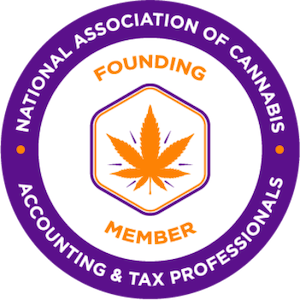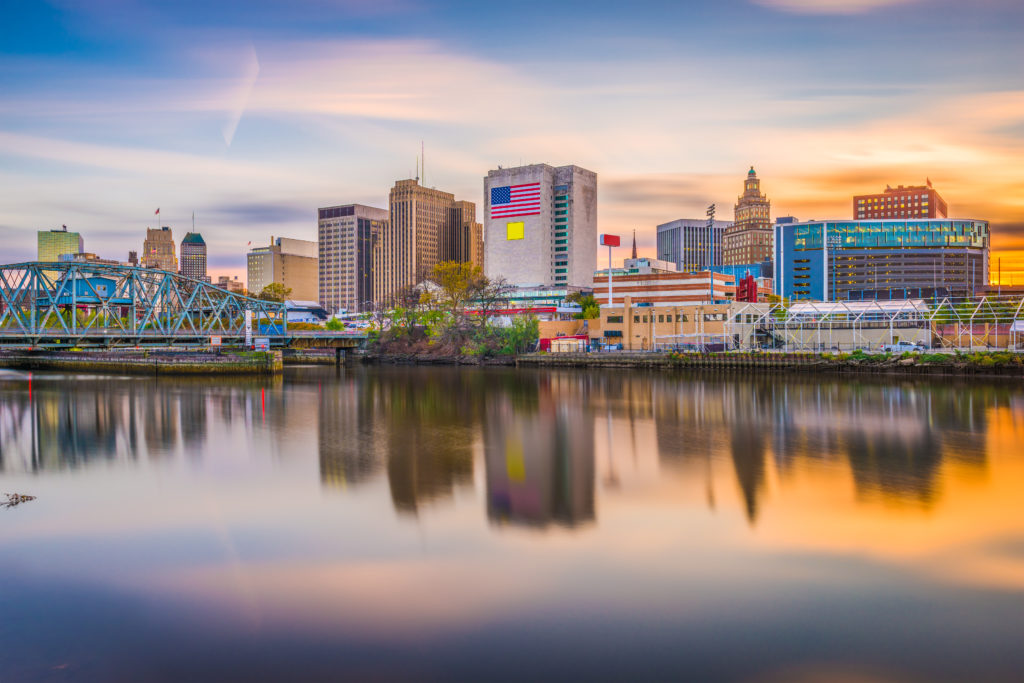
While it’s been nearly a year since New Jersey voters passed a referendum to legalize cannabis in their state, it was not until last month that regulators came together to establish the initial rules for an emerging marijuana retail industry.
After spending time taking considerations from the public, the state aims to develop a cannabis market that is prioritized on safety and equity, focused on legalizing the plant in a way that will repair the harms created by the war on drugs and provide opportunities for people of all backgrounds to participate.
But how exactly will the legal landscape of adult-use cannabis look in the state? Check out this guide to learn everything you need to know about cannabis legislation in New Jersey!
Current Legislations
There are currently three bills signed into law that set the rules and regulations for New Jersey’s legal cannabis industry.
- Bill A1897. Reforms the criminal penalties for the possession of 10 grams or less of marijuana and regulated marijuana-infused products.
- Bill A5324. Revises consequences for underage possession or consumption of various forms of cannabis.
- Bill A21. Also known as the Cannabis Regulatory, Enforcement Assistance, and Marketplace Modernization (CREAMM) Act, is the law authorizing the Cannabis Regulatory Commission to expand and further develop the state’s Medicinal Cannabis Program, as well as develop, regulate, and enforce the rules and activities associated with recreational cannabis.
The CREAMM Act for Cannabis Entrepreneurs
For those looking to open a cannabis business in New Jersey, the CREAMM Act is the most important law to become familiar with, as it answers all of the essential questions surrounding the requirements, licensing, and costs associated with starting a dispensary or cannabis retail operation.
Here are a few key points that the bill makes on the eventual introduction of recreational cannabis business:
Municipal Requirements
The CREAMM authorizes local municipalities to enact ordinances or regulations controlling the number of cannabis establishments within their borders. Each city, town, township, village, or borough is responsible for establishing its own rules for approving cannabis licenses in the jurisdiction. Cannabis delivery, however, cannot be prohibited in any municipality.
Microbusinesses
Microbusinesses are essentially any cannabis business operating with less than 10 employees in a facility smaller than 2500 square feet, possessing less than 1,000 lbs of cannabis material. These enterprises were established to create easier entry and greater competition within the market, as the application and operating fees are only a fraction of those a standard business would pay.
Establishes Limitation of Cannabis Licenses
The bill also established certain restrictions on cannabis licenses, announcing that only 37 Class 1 Cannabis Cultivators will be allowed until February 2023. There will also be a ban on vertical integration, meaning no single business can grow, produce, and sell cannabis (with the exception of expanded alternative treatment centers).
Getting a Cannabis License in NJ
On August 19th, the CRC established six classes of licenses for recreational cannabis businesses. The application period for licensing is yet to be announced, but you can stay updated by monitoring the Cannabis Regulatory Commission website.
- Cannabis Cultivator. Growing recreational cannabis.
- Cannabis Manufacturer. Producing recreational use of cannabis.
- Cannabis Wholesaler. Storing, selling or transferring recreational use cannabis items between cannabis cultivators, wholesalers, or retailers.
- Cannabis Distributor. Transporting cannabis items in bulk between cannabis cultivators, manufacturers, or retailers within the state of New Jersey.
- Cannabis Retailer. Purchasing recreational use cannabis from licensed cultivators, manufacturers, or wholesalers to sell to consumers in a retail store.
- Cannabis Delivery. Transporting already purchased recreational use cannabis and related supplies from a retailer to the consumer.
Applicants are also eligible to receive a temporary conditional permit, which allows a business to operate while they work towards meeting the requirements for a full license.
Application and Operating Fees
Here is the full breakdown of required fees for certifying your cannabis business in NJ:
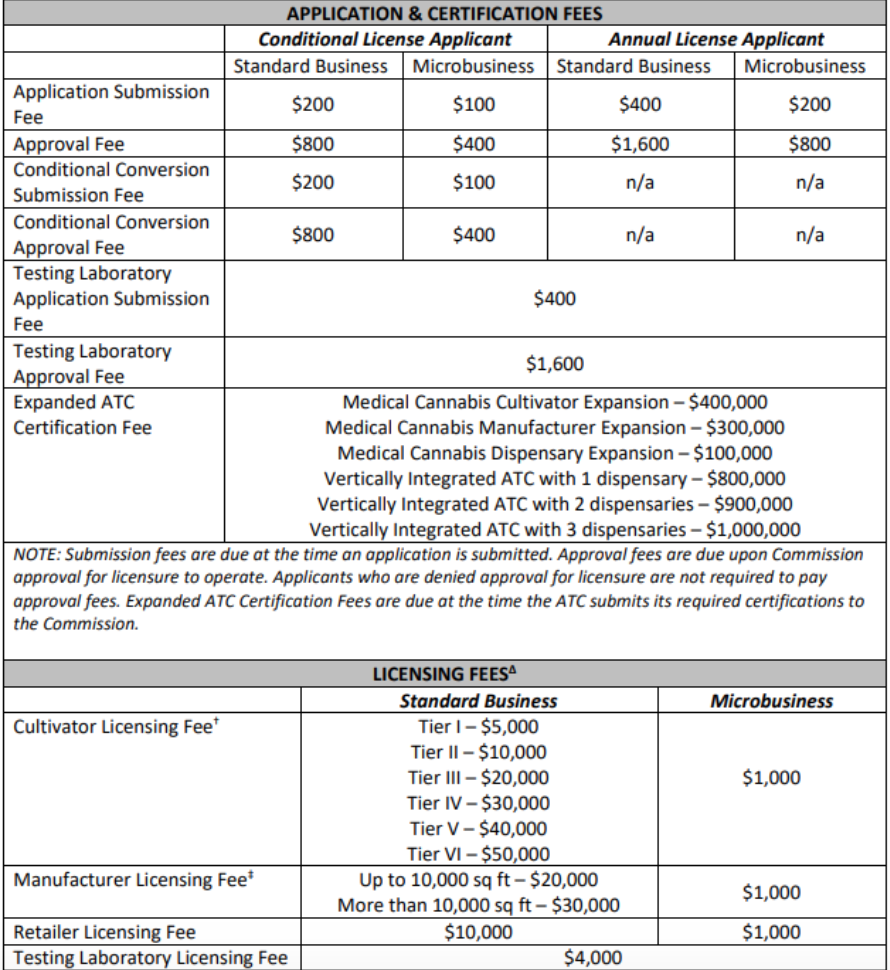
In addition to these fees, applicants will need to provide detailed information on the ins and outs of their business through a five-year financial forecast that includes projected annual revenues, operating expenses, costs, and net profit, as well as employee information.
If you are preparing to apply and are worried about adhering to the state’s compliance laws, our team of experienced accountants can help!
How Cannabis Will Be Taxed
Under the CREAMM Act, there will be a consumer sales tax of 7% placed on all sales of cannabis, and dispensary owners will pay an amount per ounce that increases as the average price drops over time.
Price of Cannabis (Ounce) | Tax Rate |
$350+ | $10/oz |
$350-$250 | $30/oz |
$250-$200 | $40/oz |
$200-$0 | $60/oz |
As far as tax revenue allocation goes, 70% will be put towards repairing the damage done by the war on drugs, and the remaining 30% will support the state’s cannabis regulatory agency and infrastructure.
Bottom Line
This is an exciting time for cannabis in New Jersey, with many hopeful entrepreneurs looking to get in on the action. If you’re looking to open a dispensary, Green Space Accounting can help you every step of the way, ensuring that your business will operate efficiently, compliantly and profitably.
Check out our website to see a full list of services, and book a consultation today!
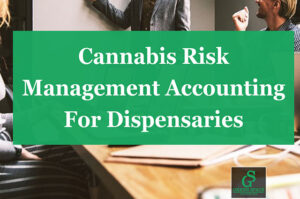
Cannabis Risk Management Accounting For Dispensaries
As dispensary owners, you have several responsibilities and you occasionally wear different hats in your business. This is hard to juggle, especially if you don’t
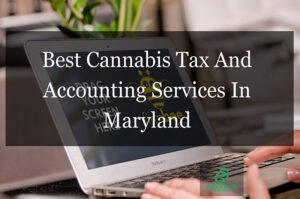
Best Cannabis Tax And Accounting Services In Maryland
If you’re a dispensary or cannabis owner looking to minimize your potential fines or fees accruing from local authorities, then you have come to the
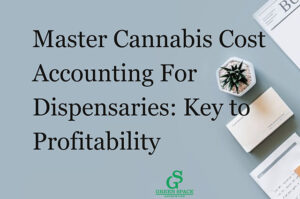
Master Cannabis Cost Accounting For Dispensaries: Key To Profitability
Your costs are part of operating your dispensary. They will always be there, regardless of the stage that your business is under. Knowing how to
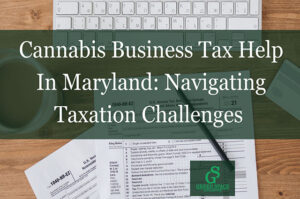
Cannabis Business Tax Help in Maryland: Navigating Taxation Challenges
Taxes are a little challenging to understand and manage, especially if you are in the cannabis industry. The industry has a set of regulations your

Financial Services Offered In The Cannabis Industry
Financial services offered in the cannabis industry can provide cannabis companies security or protection for their money. Many owners practice cash handling practices that can
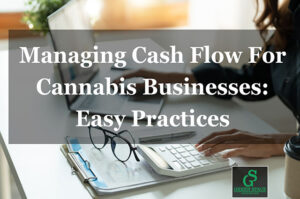
Managing Cash Flow For Cannabis Businesses: Easy Practices
Managing cash flow is a challenge if you’re trying to maintain it for financial stability. Without a stable cash flow system in place, your business



